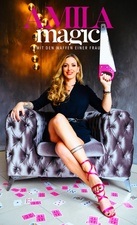Macbeth
In the organizer's words:
Scotland, a long time ago. The war is over. Macbeth and his friend Banquo return from the battlefield. They have won, are full of adrenaline, their swords still wet with blood. The name Macbeth echoes everywhere, the air buzzes with stories of how easy it was for him to kill. Macbeth the hero, assassin in the service of king and country, has a great future ahead of him. Strange creatures predict kingship for him. What is needed for this are actions bathed in blood. Macbeth should only listen to the thirst for blood that dwells within him. Encouraged by his wife, he murders his way to absolute power: first the king, then his best friends, then their families, including their children. The witches' prediction seems to have been fulfilled, at least in part. But the joy of absolute power is missing. Macbeth and his lady are consumed by guilt and remorse. Inevitably, the second part of the prediction will also be fulfilled, however unlikely its prerequisites may be. Abandoned by friend and foe, Macbeth is left with only one liberation - from himself.
Macbeth is Shakespeare's shortest and bloodiest tragedy. Written between 1603 and 1607, it is partly based on the true story of the Scottish King Macbeth (1005-1057), who ascended to the throne in 1040 by killing King Duncan I. Although his actions strike us as unimaginable and inhuman, there is an uneasy feeling that Macbeth is not just a monster. Even as he bathes in blood, Macbeth reflects on his humanity, considers his actions as an expression of a greater thought: a black thought, but a thought. He reminds us that man is a reflective animal. Macbeth is the person we could be if someone pressed the wrong buttons. Shuddering at Macbeth's crimes, we shudder at ourselves.
Jens Harzer and Johan Simons have enjoyed a fruitful artistic collaboration for many years, as evidenced by productions such as Der Schimmelreiter by Theodor Storm, Deutschstunde by Siegfried Lenz and Dostoyevsky's The Idiot. After Heinrich von Kleist's Penthesilea and Anton Chekhov's Ivanov, Macbeth is now their third joint work at Schauspielhaus Bochum.
Price information:
Students of the RUB, HSG, EvH RWL, HS BO and UW/H receive free tickets for our regular performances. This is an offer in cooperation with the respective AStAs.













